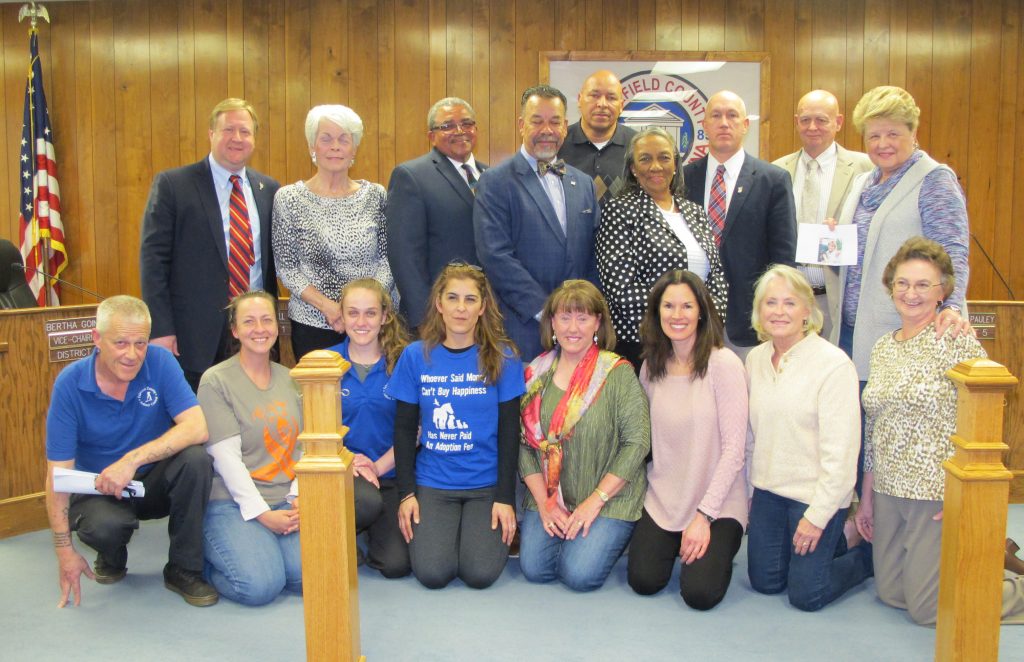
WINNSBORO – Fairfield County voted unanimously Monday night to unleash a ban on animal tethering, an important protection animal advocates say will help reduce animal injuries and abuse cases. Members of the Hoof and Paw Benevolent Society as well as staff from the county animal shelter were on hand to celebrate the ordinance.
“It’s been a longtime coming,” Hoof and Paw board member Kathy Faulk, a Fairfield County resident, said. “It’s a positive move forward for our county.”
The ordinance also includes provisions curtailing animal hoarding. The vote followed a workshop a week earlier where the county sought input from the community about the proposed law.
A key component of the Fairfield ordinance is a set of guidelines for replacing tethering with a trolley system, which resembles a zip line. With a trolley, leashes are attached to an overhead cable that gives dogs greater freedom.
Trolley lines must measure at least 20 feet between endpoints, and dogs attached to trolleys must wear a harness. The ordinance prohibits attaching the trolley leash to a collar. Harnesses are considered safer because they wrap around a dog’s chest instead of having a collar around a dog’s neck.
Councilman Moses Bell asked whether the county animal shelter might keep in stock a selection of harnesses in various sizes for residents to purchase. County Administrator Jason Taylor said that would be a good idea and he would look into the possibility.
The ordinance also calls for dogs to have access to adequate food, water and shelter.
An earlier version of the ordinance allowed limited tethering for short durations, but the final ordinance bans tethering altogether.
“[This ordinance] takes the tethering concept away,” said Tommy Morgan, the county’s attorney.
“This [revision] is needed on so many levels,” Faulk said. At an earlier meeting, she thanked council for their promotion of animal welfare in Fairfield County and also called for an end to overbreeding and hoarding in the county.
Chain, Collar Injuries
To illustrate the problem of animal abuse caused by tether ing, Faulk distributed to council members a stack of graphic photos of dogs with deep neck wounds that resulted from tethering.
“We were mortified, very sad and angry as we looked at these photographs,” Faulk said.
“We seem to be picking up more and more animals that are injured by chains and collars,” Bob Innes, the director of the county’s animal control and adoption center, added.
While the ordinance also cracks down on animal hoarding, Morgan said the ordinance isn’t directed at legally operated kennels or livestock.
In regard to multiple animals living in a home, Taylor said owners of multiple indoor animals must first have a license, and it must be determined that the location is suitable for this type of operation.
“More rules will need to be put in place to state what will qualify as a kennel,” Taylor said. “The state rules for a kennel are that you must have a concrete floor with a drain to be able to be washed out each day and have a place for the drain water to go,” Taylor said.
“Once the ordinance is in effect, will there be a window with proper notification before citizens are held accountable to the new rules, such as the new trolley/harness system?” Council Douglas Pauley asked.
“It should be up to the officers who respond to the calls to let the citizens know of the new rules and that should take care of a large part of this concern,” Councilman Jimmy Ray Douglas said.
“Once the ordinance is in place, it would be hard to swing the pendulum to the other side immediately and think everyone will immediately know the new rules and be on board,” Taylor said. “There will be an education period, which will include working with the Sheriff’s Department. In extreme cases, the new ordinance will be followed. However, within reason, we will work with the citizens,” Taylor said at the earlier workshop.
Bob Innes, Director of the Fairfield County Animal Shelter said the ordinance was desperately needed, and suggested it should be phased in, possibly beginning with the new fiscal year.
Animals Trapped in Vehicles
The ordinance also addresses animals left in vehicles.
“Any regular citizen can break a window if the owner of an animal [trapped in a vehicle] cannot be found,” Innes said.
At the workshop, Ridgeway resident Randy Bright called all kinds of animal abuse a “stain on our entire county.”
Bright repeated his previous calls for the solicitor’s office to more aggressively prosecute animal abuse and neglect cases. He also noted some cases could be prosecuted under the new federal animal cruelty law, which carries penalties of up to seven years in prison for the most serious offenses.
“How can we leverage that? Federal laws have the highest penalties it seems,” he said.
This is Fairfield County’s second revision in as many years to its animal control ordinance.
In 2018, council revised the ordinance to include a $500 civil fine for violations. The updated law also includes more detailed definitions of nuisance animals and requires all pets to be fed once a day and provided potable water. It also requires mandatory reporting of pets struck by a vehicle.
The Fairfield County’s anti-tethering ordinance mirrors a similar ordinance that Aiken County adopted in 2017. Aiken County Administrator Clay Killian told The Voice that the ordinance has not faced any legal challenges.
Taxpayers Pay for Abuse
Innes said all types of animal abuse cases, including over breeding and hoarding, burden taxpayers in the long run.
“There’s a lot of people in this county that are just chaining a dog and just breeding it and breeding it,” Innes said. “They dump puppies on animal control, which means taxpayers are picking up the bill.”
The newly approved animal cruelty ordinance is available on the county’s website: fairfieldsc.com.
Barbara Ball contributed to this story.












